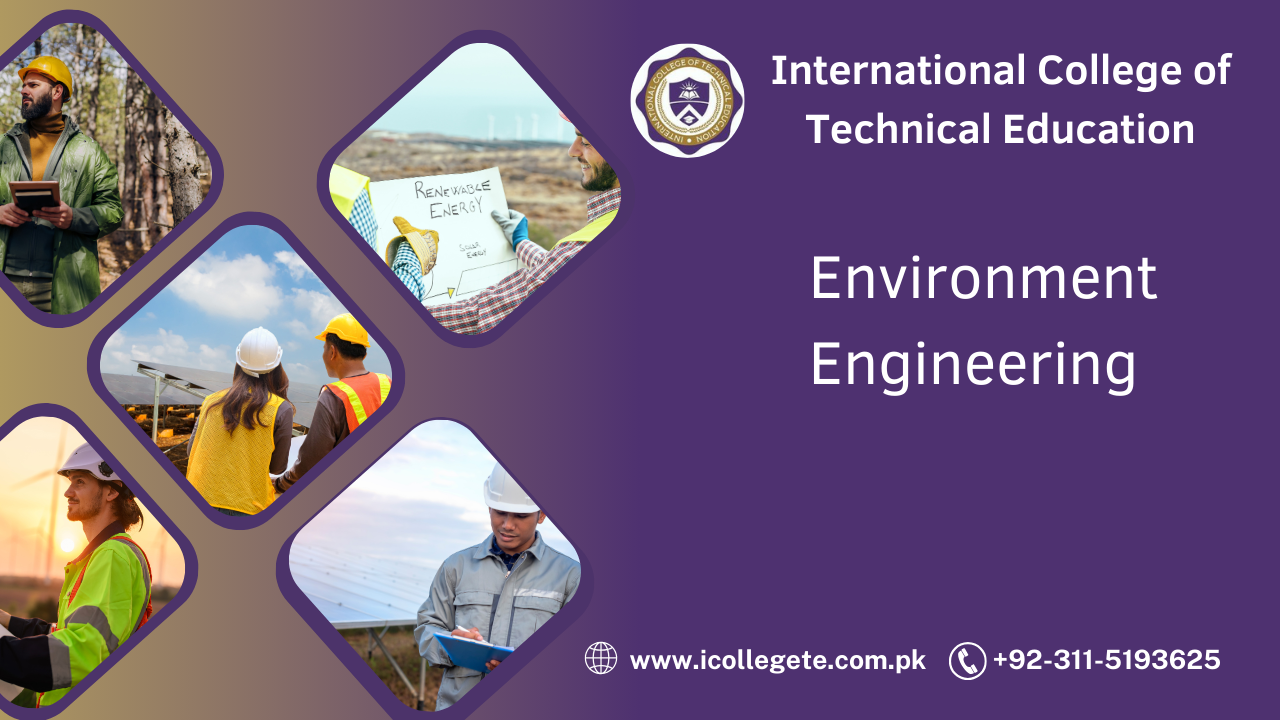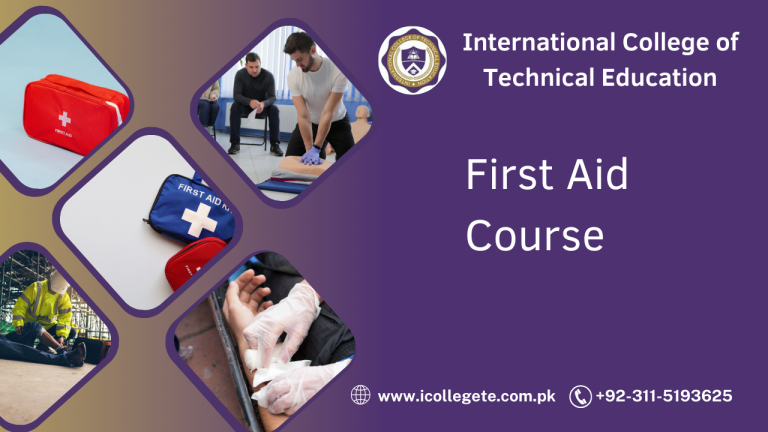In today’s world, environmental issues like pollution, waste management, and climate change are among the most pressing concerns globally. As industries grow and populations increase, the demand for sustainable development becomes more urgent. Environmental engineering plays a crucial role in addressing these challenges by designing systems and solutions that protect the environment, promote sustainability, and reduce human impact on natural resources.
The Environmental Engineering Course in Islamabad is designed to equip individuals with the technical knowledge and practical skills required to solve modern environmental challenges. This course covers a broad range of topics, from water and air quality management to waste treatment and sustainable energy solutions. By enrolling in this course, participants gain the expertise to contribute to the development of cleaner, healthier, and more sustainable environments.
Course Overview
The Environment Engineering course in Islamabad is structured to provide students with a thorough understanding of how engineering principles can be applied to environmental issues. The curriculum focuses on the science and technology involved in managing and improving the environment. Students will be introduced to various processes and technologies used in water treatment, air pollution control, waste management, and renewable energy solutions.
This course also emphasizes the importance of adhering to environmental regulations and standards, which are essential for ensuring that engineering projects are both efficient and environmentally responsible.
Study Units in Environment Engineering Course
- Introduction to Environmental Engineering
- Understanding environmental issues and sustainability
- Role of environmental engineers in society
- Key concepts: ecology, environmental science, and engineering
- Water and Wastewater Treatment
- Principles of water quality management
- Treatment processes: primary, secondary, and tertiary treatment
- Design and operation of water treatment plants
- Wastewater treatment and reuse strategies
- Air Quality and Pollution Control
- Sources and types of air pollutants
- Techniques for air pollution control
- Design of air pollution control systems
- Regulatory frameworks for air quality management
- Solid and Hazardous Waste Management
- Waste classification and characterization
- Waste reduction, recycling, and disposal methods
- Environmental impact of waste
- Design of landfills and waste treatment facilities
- Environmental Impact Assessment (EIA)
- Understanding the EIA process
- Methods for assessing environmental impacts
- Legal and regulatory aspects of EIA
- Case studies of environmental impact assessments
- Sustainable Development and Renewable Energy
- Principles of sustainable development
- Renewable energy technologies: solar, wind, geothermal, and biomass
- Energy efficiency and conservation
- Integrating renewable energy into urban planning
- Environmental Laws and Regulations
- Overview of local and international environmental regulations
- Environmental policy and law enforcement
- Compliance and environmental auditing
- Role of environmental engineers in policy-making
- Climate Change and Global Environmental Issues
- Causes and impacts of climate change
- Mitigation and adaptation strategies
- Role of environmental engineers in addressing global challenges
- Case studies on climate change solutions
Learning Outcomes
Upon successful completion of the Environment Engineering course, participants will:
- Gain a comprehensive understanding of the environmental challenges facing the world today.
- Acquire technical knowledge on designing and implementing sustainable engineering solutions.
- Be proficient in water and wastewater treatment processes, air pollution control, and solid waste management.
- Understand the key principles of environmental laws and regulations, ensuring compliance in engineering projects.
- Develop the ability to assess and mitigate environmental impacts through effective Environmental Impact Assessments (EIA).
- Be familiar with renewable energy solutions and their role in sustainable development.
- Be prepared to contribute to global environmental initiatives and climate change mitigation strategies.
Course Benefits
- In-depth Knowledge: Participants will acquire an extensive understanding of environmental issues and solutions, preparing them to work on real-world projects that address pollution, waste, and energy challenges.
- Hands-on Training: The course provides practical training on using environmental engineering tools and technologies, which is essential for working in the field.
- Career Opportunities: Graduates of this course can pursue various roles in environmental consulting, government agencies, and private sector industries focused on sustainability and environmental protection.
- Sustainability Expertise: The course focuses on developing sustainable engineering solutions that have a long-term positive impact on the environment, making it ideal for those passionate about addressing global environmental challenges.
- Global Relevance: Environmental issues are universal, so the knowledge gained from this course is applicable not only in Pakistan but also in other countries, opening international job opportunities.
- Contribution to Policy and Change: By understanding environmental laws and regulations, students will be well-equipped to advocate for better policies and practices that foster environmental protection and sustainable development.
Who Is This Course For?
The Environment Engineering course in Islamabad is ideal for:
- Engineering Graduates: Individuals with a background in civil, mechanical, chemical, or electrical engineering who wish to specialize in environmental engineering.
- Environmental Enthusiasts: People who are passionate about sustainability, environmental protection, and working toward a greener future.
- Government Officials and Policy Makers: Those involved in regulating or managing environmental standards, who need an in-depth understanding of environmental engineering practices.
- Students and Fresh Graduates: Individuals pursuing careers in environmental engineering, sustainability, or environmental science.
- Corporate Sustainability Managers: Professionals working in industries like construction, energy, and manufacturing who wish to implement more sustainable practices in their organizations.
- Consultants and Entrepreneurs: Environmental consultants or those looking to start a business focused on environmental services, such as waste management, renewable energy, or water purification.
Future Progression for Environment Engineering Course
Completing the Environment Engineering course opens up numerous career pathways and further educational opportunities. Some potential future progressions include:
- Master’s Degree in Environmental Engineering: Graduates may choose to pursue advanced studies in environmental engineering to deepen their expertise and increase their job prospects.
- Professional Certifications: Consider obtaining certifications from recognized bodies such as LEED (Leadership in Energy and Environmental Design) or become a Certified Environmental Professional (CEP).
- Sustainability Consultant: With additional experience, professionals can advance to become consultants, advising organizations on how to meet sustainability goals and comply with environmental regulations.
- Government and NGO Roles: Professionals can work with government agencies or non-governmental organizations focused on environmental policy, climate change mitigation, and conservation efforts.
- Renewable Energy Sector: With the increasing demand for clean energy solutions, there is great potential for environmental engineers to work in the renewable energy sector, designing and managing sustainable energy projects.
- Research and Development: Environmental engineers can pursue research roles in academia or industry, developing new technologies and techniques to combat environmental challenges.
The Environment Engineering course in Islamabad is an excellent opportunity for anyone interested in addressing the world’s most pressing environmental challenges. With its comprehensive curriculum, hands-on approach, and focus on sustainable solutions, this course provides the foundation needed to build a successful career in environmental engineering. By acquiring knowledge in key areas such as water treatment, waste management, air pollution control, and renewable energy, students are empowered to make a positive impact on the environment. Whether you’re a fresh graduate or an experienced professional, this course offers the tools you need to become a leader in environmental protection and sustainable development.







